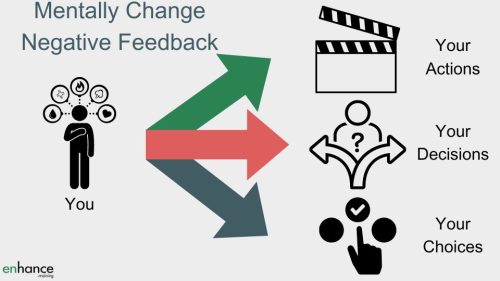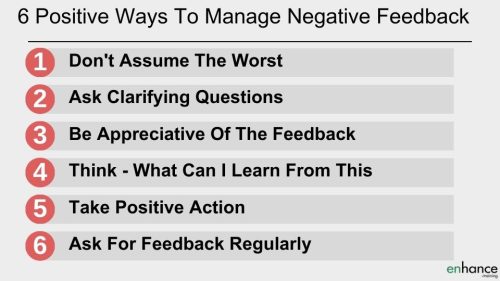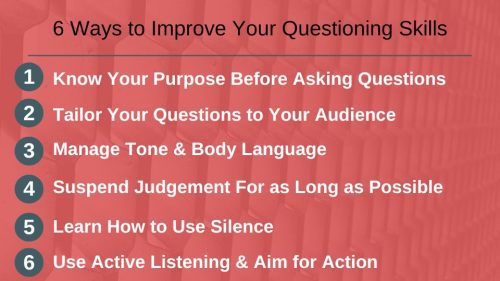6 Positive Ways to Manage Negative Feedback at Work

Receiving negative feedback at work can be a devasting blow for some or an amazing opportunity for others. The difference between these outcomes is in your mind. Whenever we are learning feedback is a gift – a way of speeding up our improvement or extending our skill level beyond what we could learnt on our own.
In the sporting world, nearly every serious athlete has as coach to provide them regular feedback so they can keep improving. In the business work, many senior managers have coaches to provide them with feedback to improve.
It would be lovely to only get positive feedback, yet we usually learn more from what we didn’t do as well. To help you turn even the most negative comments at work into a learning opportunity for you, I am sharing these 6 positive ways to manage negative feedback at work
6 Positive Ways to Manage Negative Feedback at Work
- Don’t assume the worst
- Ask clarifying questions
- Be appreciative of the feedback
- Think – what can I learn from this
- Take positive action
- Ask for feedback regularly
Watch on YouTube
Listen on Podcast
Being able to positively receive negative feedback is a sign of professionalism, maturity and self-confidence. Taking positive action from negative feedback shows determination, the will to work and improve, and demonstrates you are a safe bet to invest in further skills development. All of these attributes and responses will progress your career quicker.
Don’t assume the worst – The first positive way to manage negative feedback
When you have worked hard and done your best and then get negative feedback it is really easy to take it hard, get angry or dismiss the feedback.
Give yourself time to process your emotions and calm yourself down. This might be just nodding and trying to take in what is being said so you can reflect on it later. Keep how you express your emotions under control.
The manager who is giving you negative feedback may be really good at communicating this without upsetting you or they might be terrible at it and leave you feeling awful.
When dealing with negative feedback at work try hard not to take it to heart. In your mind turn any negative comments that attacks your self-worth into statements aimed at your actions, decisions, or choices.
For example you are told “you did this really badly” but mentally turn this into “the actions I took went really badly”. This mental trick helps you manage your emotions and keep a positive mindset.
Your actions, decisions or choices are also much easier for you to change than your personality.
I personally always think about feedback I receive, consider if it is valid or reasonable by trying to put myself in the other person’s shoes. Think about the situation objectively before properly accepting the feedback or rejecting it.
Follow a similar process when dealing with negative feedback from a colleague. Don’t assume the worst when receiving negative feedback or negative comments at work.

Ask clarifying questions – The second positive way to receive negative feedback at work
When a manager or colleague takes the time to provide feedback – positive or negative – it make sense to learn as much as possible from the feedback.
Ask clarifying questions. You are trying to understand what has led to the feedback, and make sure the negative feedback is specific and useful to you. No-one wants to go through the trauma of receiving negative feedback that you can’t do anything with.
So ask as many questions as you can. Some example questions
- “Would you mind expanding on that comment as I don’t fully understand it?”
- “Do you have a specific example in mind that you could share so I can get a better understanding?”
- “When you say … what exactly do you mean?”
- “I want to learn as much as possible, can you tell me know about why you think that?”
Gain the best understanding you can. Asking questions also gives you time to calm your emotions down so you can consider what is being said.
Asking clarifying questions is a great way deal with negative comments at work made by colleagues looking to put you down. Ask good questions with confidence, and you can stop these types of negative comments very quickly.
Be appreciative of the feedback – the third positive way to manage negative feedback at work
At the very least acknowledge the feedback even if you don’t agree with it. For example say either “thank you” or something like “I appreciate you taking the time to let me know what you think”.
Don’t get defensive with negative feedback. Don’t try to justify why you took the actions, decisions or choices that led to the negative feedback. All this does is confirm that you haven’t listened to the feedback, haven’t taken it in or haven’t accepted it. How to accept feedback from your boss professionally includes listening carefully and demonstrating you have taken in what was said.
Getting feedback helps you improve what you do. Be appreciative that a person has taken the time to provide you feedback in the first place. If you show your appreciation, you are much more likely to continue getting feedback which will help you improve what you do a lot faster.

Think – “what can I learn from this?” – a must went receiving negative comments
Feedback is an opportunity to learn and improve. Improving what you do will help you in the medium and long term whatever your job.
My worst boss ever gave me a load of feedback that demonstrated that he had no idea what I was doing or how well I was doing it. The feedback was still invaluable – I learnt that it was a bad idea to have a boss – no matter how poor – not being aware of what I was doing. Their ignorance did not help me and I changed how I proactively communicated with all my bosses after that.
The point of the story is that there is opportunity to learn from all feedback you receive, even if what you learn is a long way from what the person giving the feedback intended.
Always seek out what you can learn and improve on following any feedback, positive or negative.
take action and stay positive – The fifth positive way to manage negative feedback
There is nothing better than giving feedback to a person and seeing them take positive action based on that feedback. Taking positive action is the best way to respond to negative feedback from your manager. Taking positive action demonstrates your maturity, your resilience, and your professionalism.
Taking action makes you a more reliable and valuable team member – you are showing you will improve.
In my view, it remains important to evaluate and consider all feedback before deciding to take action or not take action. When you decide you need to take action, then choosing what action you are going to take is also important. It is your career, your life so don’t just take action because someone else thinks taking action is a good idea. Make sure you are clear about why you are going to take action and make sure that it benefits you.
Do your best to stay positive even if you have a terrible manager constantly giving you negative feedback. There are people that are never happy. Try hard not to allow yourself to be dragged down because of negative feedback or comments. I appreciate it is easy to say and much harder to do.
Stay positive and take action when you think it is in your best interests.
Ask for feedback often – So you keep getting positive and negative feedback at work
Getting really useful feedback at work, in my experience, remains fairly rare. As you become more senior in your career and you influence the success of more people, getting useful negative feedback about what you are not doing well becomes harder and harder.
Ask for feedback as often as possible. If someone is brave enough to provide you good specific useful feedback, listen, thank them and then think about the feedback later. Never get defensive, aim to get back at them or take any other negative action. Taking any of these steps will stop feedback from that person and anyone else in your team.
Although no feedback might seem easier, getting no feedback is absolutely not in your best interests. All feedback is essential to learning quicker or learning full stop. Try to ask and get as much feedback as possible. Doing so will help you improve what you do faster, which will help you, your career, team and company in so many ways.
Ask for feedback often.
in summary
Getting feedback is a gift for all those that want to learn and improve at work.
Learning how to deal with negative feedback from your boss or colleagues is important. Use the positive ways we have covered to turn any negative feedback into a good learning opportunity for you and a way to get better at what you do.
Using these steps will also help you build up your resilience over time which again helps you remain positive and improve how you use negative feedback without taking it personally or getting down because you have received negative feedback.

I hated getting negative feedback and I really appreciated it in equal measures. I wanted to be doing a good job and receiving negative feedback meant I wasn’t. I also knew that to improve, I needed to get feedback and a good portion of this would be negative.
I continued to improve, work in more senior positions and the useful feedback grew less. As your influence and impact on the business increases you get less useful feedback of any kind to improve which I also found tough.
Ask for and use all feedback you get, positive or negative to improve what you do.








